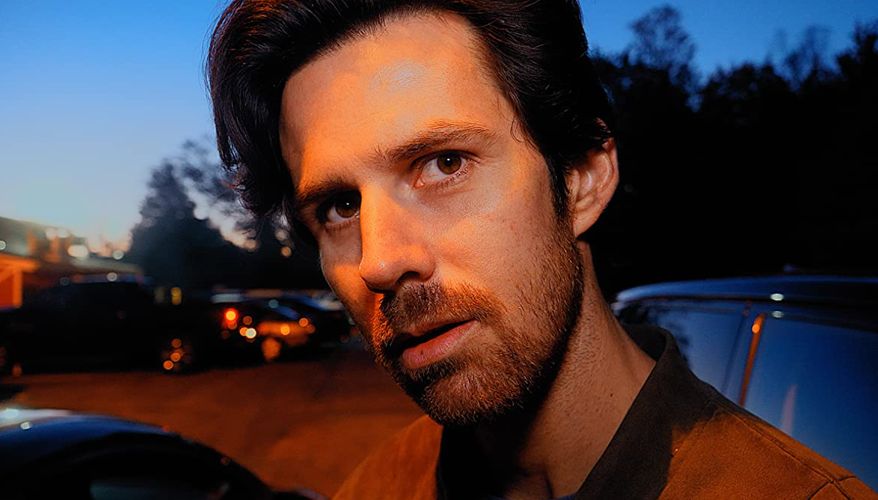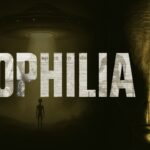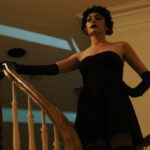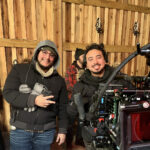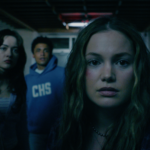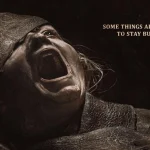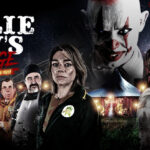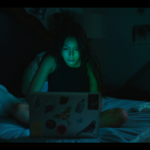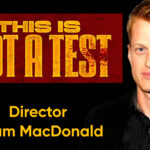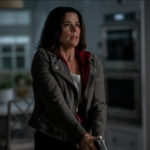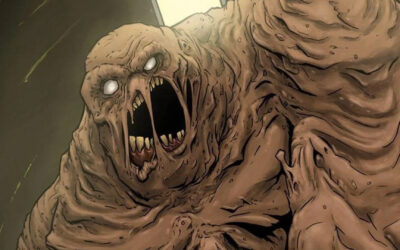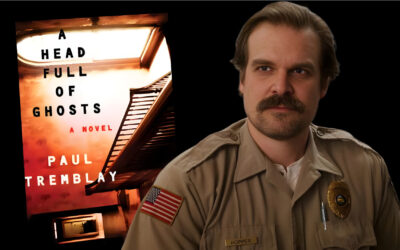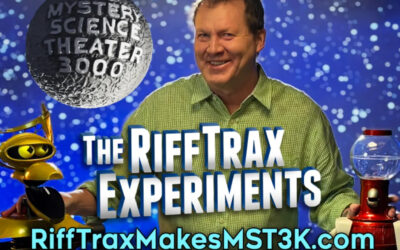Ahead of its premiere this month, actor-writer-director Bret Lada sat down with us to discuss his found footage film. The Andy Baker Tape, reveals the last known footage of a food blogger and his brother.
The film, which took home 26 awards at film festivals, premieres on the Terror Films Channel on August 5, 2022, before a wide digital on August 12th followed by its arrival on Kings of Horror on August 19th.
Kelli: “So tell me about this film, The Andy baker tape?”
Bret: “It was a project of love that I created with my writing partner, Dustin during the pandemic. I worked mostly as an actor, and Dustin was a “Blue Man.” He was with a blue man in Boston.
I was working in the film a lot right before the lockdown I ended up, I was in a short film that won the academy award that helped me get a little brand through sag. And then I put it towards the cam, uh, camera. I never actually worked on the other side of the camera. I spent the first three months of the lockdown figuring out how to shoot and edit color braid. And I was producing some short films with Dustin, just as kind of a, uh, an experiment to keep ourselves occupied during the lockdown. Uh, we start to write a script, a feature, I guess it was about may of 2020 that we were gonna take on the road. Then the first concept was kind of this documentary travel to the heart of America. And then once we actually got writing the script down, we realized that we were going to do as well, have to really kind of take our time and tune his vocal, which is what we did. And the Annie baker tape really came out of those first few months of quarantine and trying to keep ourselves motivated and creating during a really dark time in the entertainment field.”

Kelli: ” I know that a lot of people think that the lockdown was just terrible but so many good things have come out of it, especially when it comes to movies.”
Bret: “I agree, you know, but certainly, it didn’t come without a lot of costs and certainly some other career hang-ups, but as far as forcing up the state of creativity, it might have been one of those more productive times I’ve ever had in my career. I was able to solely just divert all my focus into creating something. And I think that’s what got me through the other side of the lockdown just having a project that I could devote myself to.”
Kelli: “Tell me about the food blogger trip and things. The trailer looks kind of wild.”
Bret: “Yeah. Yeah. We wanted, we needed to figure out a way that we could get the two of us together into a story. And because we were doing that during the lockdown, the pandemic, we also had a minuscule budget and we couldn’t have the huge film crew on the set of us. We couldn’t have a true cinematographer. We couldn’t have a sound team. You know, we were all team before that. So we needed to figure out a way that we could do this entire thing to hand it, which is why we handed on doing it in a sound footage style. The food blogger came out of the necessity to keep the camera rolling the entire time. And that’s one angle that was never, ever, um, done in a found footage show before, you know, we haven’t seen the blogger angle. I studied tons of the popular YouTube guys and we borrowed some of their styles and that’s how we, number one, it allowed us to keep the camera rolling the entire time. And it was just a unique vehicle for us to shape this story around and give us a reason to go on the road, give us a reason to come together, another reason to keep the camera rolling as these two are going through their, their journey together.”
Kelli: “Okay Can you tell us a little bit about what happens in the movie, a taste?”
Bret: “We bill the film as the last known footage of food blogger, Andy baker. He is the food blogger who discovers through a DNA website that he has, a half-brother that he never knew about. The brother he’s in the process of getting his YouTube show, getting produced by the food network. He realizes that he needs some more help doing so. And he enlists his brother to go on the road with him. And the film is about the journey of those two on the road. They’re bonding them coming together and then realizing a dark family secret. And from there the events turn and turns into a dark, and psychological thrilling. And I don’t want to give anything more away, but the first half is their bonding. And the second half is when they’re really deep family secret reveal and the two get cold apart.
Kelli: “Great. Well, I have to say just judging by the trailer, it looks really good.”.
Bret: “Well, thank you. You know, we had a lot of fun doing it. We were watching two people go through this journey. I didn’t want to have an autonomous dialogue. We try to keep it as real as possible. And I think that serves our story the best that it could.”
Kelli: “You had a hand in pretty much every aspect of this film, writing, directing, acting. Was that difficult to do?”
Bret: “Yes. And you know, I have spent years studying drama and film. I’ve been in here. It hit me that this was a chance that I could work outside of my traditional wheelhouse of just being a performer and really rely on all of my facilitations and all the storytelling lessons that I’ve learned over the years. I really did have a lot of form shaping the narrative of this through the writing, through the editing. Um, the directing of it was also a lot of fun and I’ve certainly picked up great lessons from great mentors that I’ve been on sets with. And I’ve seen the way they’ve shaped stories. I’ve seen the way that they handle, um, other actors. And I think that was valuable in helping me dial in the story that I wanted to. One of the harder technical elements that I had to learn was color grading and it’s, uh, my new detail, but it just kind of puts the extra touch.”
So, I did have to expand my existing knowledge and learn some new skills. Uh, I certainly enlisted the help of others, uh, the person that deserves a lot of credit is Arthur Giamalidis, who is my sound engineer. Arthur is working remotely from Melbourne Australia. So we were editing the sound on this. He was doing, we were doing everything on a 16-hour time difference which took a lot of time. So when I would wake up, it would be nine in the morning for him. It is nine at night, and we would, you know, have to work on opposite schedules. I utilized the help of producer Caitlin Borek, and she was great in helping shape the story. Once we had the footage, she helped dial in on the final product of fifteens a little bit too long, a little bit too short.
Dustin was a fantastic collaborator as far as a writer and an acting partner, and he really gave a lot to this project. Matthew Dubrow and his band provided incredible music for us. And the same with Jerome Schuller and his band, Molly and the Pineapples. While my name is on it as director, I truly had to utilize the entire team that I just mentioned, and without their assistance with what they brought to the project, we wouldn’t have the product that we do. So it certainly takes a village to put on these productions. And I’m lucky that I had such a good tribe that was around to help create being, take, take with me.”
Kelli: “t takes the team, to make something like this come together.
Bret: “Absolutely. And I’d say, you know, this, like this was the first feature film that I directed. I worked as a producer on a project in 2018, but taking a project from beginning to finish, was almost like, a film school for us. It was for me. It was certainly a learning curve and a learning experience. And also the production aspect outside of the, just the normal rounds of making the film. I would say marketing and getting ourselves in front of the right festivals, getting our distribution, and getting some extra funding to help. I certainly my team and I wore a lot of different hats over the course of the last year and a half to get us to where we are. I followed models of filmmakers that came before me that had that success.
But for a lot of us, we were learning on the fly, how to do this and that while that was certainly a little bit daunting. It also was a very fulfilling experience. And I, if anything comes out of this, it’s the confidence of knowing the right roads that I can take in the future on, on my future projects and, and having gone through a project from start to finish and learning from the mistakes that we’ve made along the way, learning from them the good experiences we had on the way was that was the most valuable experience from this entire project.”
Kelli: “Right. Right. You said in the second half is when it picks up with the dark family secret. Is this more of a psychological horror?
Bret:” For us? It’s a psychological horror. You know, there are certainly a lot of comedic elements in the film too. And we want to take, we, we describe the film as a role where there are laughs and thrills and chills stairs and want the viewers that feel like that they a great ride when they come out the end, certainly don’t want to leave people feeling like it was just an on the slog. The entire thing is horrifying. That was my mission in directing this, wanted people to go on a ride and come out feeling, Ooh, that was a lot of fun. I would bill it to my team and I would bill it certainly as a, as a psychological thriller. I would say that our film is really a “Plains, Trains, and Automobiles.”
Kelli: “I know a lot of effort went into making the film but was your favorite part?”
Bret: “I don’t know if I can dial in on one. I truly had a lot of fun doing this. I would say shooting it. Some of the food blogging scenes were a lot of fun. We got to go to all these trade locations around New Jersey, all these famous roadside foodstuffs, and we shot those in real sign while these restaurants were open, while people in the parking lot are screaming at us, really asking us, are you guys from YouTube? Are you guys doing YouTube shows and anything could have happened during that time, which made it a little bit daunting, but it also made it exhilarating? And to have that pressure off, we have one take, we have $150 worth of food in front of us. We have to make sure that this works. That was certainly the most fun. I think, shooting him. Some of the shots that we had in the film get complicated.
We do a lot of single take action. And those were also done in real locations in the middle of the lockdown with tons of people around. No, one’s knowing what we’re doing. And we shot one of those scenes at a really bizarre roadside hotel in south Jersey and in the city. And it’s a scene where both characters are running half-naked through a parking lot at three in the morning, chasing each other around, and doing so we were probably the most inconspicuous part of that entire hotel parking lot. I think there are a lot of weird things going on there that night, but we had an audience of people watching the student, not knowing what’s going on, thinking that were had had, there were, were some kind, uh, at one scene in particular where we had the police called on.
Bret: “People thought that we were on the street, really disagreeing. And then the cops showed up and we explained and said, no, no, you know, we’re vocals, we’re shooting the film. We did this, and then the cops were so excited. Like this is great. This is awesome. We’re gonna call everyone back and know that what you guys are doing is cool. And, you know, it was just, the entire thing was a lot of fun. And I think that you have to bring that energy filmmaking and you have to have fun with what you’re doing, even when you don’t have all the right answers and you attack problems, or you can different scenarios with that mindset of we’re going and have fun. See what happens and be adaptable. That’s where the best possible results come. And Dustin and I certainly have fun for weeks of filming. The script in itself is a fun ride to go through, even though it gets dark. So just trusting you, what road trusting each other and trusting each area was the most fun he could have on the film
Kelli: “That’s a great story. I would have loved to have seen that. You know, you can tell when you’re watching a movie if a filmmaker is really into it, or if it’s just like for money, you can tell.”
Bret: “Yeah, well, we certainly didn’t do it for money because we, I mean, I don’t know which we’ll make anything back on it, but that was never the goal. The goal was just to get a project for us to do office with each other and, and have a creative experience, during the pandemic. You know, even if we just played one film festival, this is it’s great. You know, at the time we didn’t think that we were gonna make anything. Now, fortunately enough, we played 26 film festivals last year. We have 26 awards across the board from everything from best feature film, best horror, best actor, best supporting actor, and best screenplay.
We’re so grateful for that. In the film, if you put something out there, you never know how it’s going to be received right now. Not every one that saw this film, lucky that’s okay. You know, we, we wanted to just put our stamp on something, get it out there. And I’m so grateful for the people that saw this film, went on the ride with us, and said, yes, this, this is, this is a lot of fun. And we, we made the film for people to have fun. So if, if that’s what we get out of it, that’s great.
Kelli: “I get exactly what you’re talking about. So when will everybody gets to see this film?”
Bret: “So we have a three-tier rollout so far. Our first rollout is, next Friday, August 5th, it’s 3:00 PM Pacific time on the Terror Films YouTube channel. Then on the 12th, it becomes available on multiple platforms.
It’s going to stream on Kings of Horror, which is another great YouTube network. They have tons of horror films on there. I believe that’s Friday, August 19th. And I’ll be doing live chats throughout readings on both the fifth and the 19th. So anyone that watches during then you can ask me any questions about the film, any questions. I hope people can join us for both.”
Kelli: “Okay, awesome. I’m sure our readers would love that. A moment ago you mentioned your acting career. Can you tell us a bit about it?”
Bret: “Yes. I met my co-writer in this is that we both went to drama school at Montclair State University, I went through a four-year conservatory program there. I came out of school, did some regional theater first, and then I stayed in New York to focus on film television. My, first great job was on “Alpha House,” which was Amazon’s first scripted show. And that was with John Goodman, Bill Murray. Garry Trudeau was the showrunner on that. Most of my teams are opposite John Goodman, which was an incredible experience.”
Kelli: “I bet. Goodman is amazing.”
Bret: “Also we filmed with Kelly Rippa one of the episodes, we ended up shooting on that Kelly and Michael show, and there I have this great, you know, we shot that in front of a live studio audience doing, you know, watching the Kelly Rippa show. We had one take to do that. Andrew McCarthy, from, The Rat Pack was the director. It was just an amazing experience. And that was really kind of a, you know, I think doing that, prepped me to be able to work well under pressure when you have one take of something and then you around. And that’s what a lot of network TV is like, we’re always working, we’re always pressed on time. We’re always racing at the clock. You have one tape to get it right, get out. And that can be very daunting because, you know, in theater you can always go back the next night and do another performance. But when you’re doing television, once it’s on film, it’s there and it’s never gonna be erased, you know? And if you, if you are out of it and if you’re, you know, if you goof up on something that is solidified, so, you know, you really have to learn to dial yourself in and be present. And that was certainly my first trial by fire experience. Uh, after that, I went on to do some, you know, I did lifetime first scripted show. I loved you, but I lied, which was I Al it was shot very similar to how I shot the baker tape. And I really learned a lot from being on that set also that was shot almost in the documentary style as well, and seeing how they were able to do so, you know, most shows they shoot or, you know, say most dramas or comedies the 30 to the 60-day script.
And they shoot that over seven days. I love you, but I lied. We did about 30, 45 pages in three days because we shot it in this monumental style. When you didn’t have to have the same kind of narrative lighting that you, you know, more realistic lighting and you kind of use practical lighting and doing so you can get through scenes a lot quicker, but it doesn’t have the same polished book that it, you know, for instance, like the movie doomed us, where you have the most brilliant lighting imaginable, you know, and it’s it shaped that way. And that’s what really takes the most time when you’re on, when you’re on sets is getting the lighting, right, getting everything right, where this style allows you. It gives you a more, it gives you a simpler, more realistic book, but it also allows you to through text a lot quicker.
And that’s where I think the ideas like, oh, I could shoot something like this, do it in a budget-friendly way and also do it with the minimal crew. So I, I learned it, you know, I think some of the ideas from the Andy baker tape started around then, but then after that worked, I’ve worked on some other great shows. I did, I did the pilot of the pose, which was a Ryan Murphy show, which was on FX, directed by Ryan Murphy in that law. And the order was a great experience. I worked with IP on that, and that was, you know, he was a great, a great guy to work opposite of. I did this great sci-fi film where I shot the three months with Jerry O’Connell, That was a great experience. My, first production of a project was in 2018, which was this dark Irish caper story called Misty, but which is available on Amazon Prime. That was my first time believe working front and behind the camera. I acted in the project, but I also helped produce that and was on the casting side of everything was on the script shaping side. The editing process of that was on the marketing film festivals. And that was my first time. I really kind of, I guess, branched outside of the traditional length of just being an actor. Um, but then I went back to doing a lot of TVs afterward, too. You know, I did “Orange is the New Black.” I did “Confessions” on HBO. All of those were just great opportunities to work opposite some excellent actors.”
Kelli: “I can only imagine. You have worked with a lot of amazing, talented people, on great movies and series. I’m glad that those experiences prepared you for ‘The Andy Baker Tape’ and I know our readers will enjoy it.”
Be sure to follow The Andy Baker Tape on Twitter and Instagram and visit the official website for live Q&As and more. Bret asked me to tell our readers to reach out to him if they have any questions or comments about the film. So, drop him a line and let him know what you thought.

